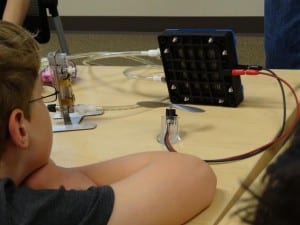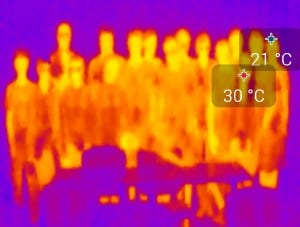Satori Summer Camp
Eager students at Satori Summer Camp watched in anticipation as special guest professor Dave opened the valve from the small hydrogen cylinder to the fuel cell and a fan began spinning – clean electricity without combustion – almost like magic. Professor Dave is David Lott, Plug Power’s senior scientist, whose day job involves working with Plug Power’s core technology, including fuel cell stacks for both our material handling and stationary power products.
The science of fuel cells is an everyday occurrence for Dave – his amazement came from the realization that the fuel cell demonstration he shared with the campers is older than any of the students in his class – a testament to the long-term reliability of our products!
A camper looks on during a fuel cell demonstration
Satori Summer Camp is a week-long enrichment program for gifted youth grades 6 to 12 hosted at the campus of Eastern Washington University, about 15 miles outside Spokane, Washington. The camp’s course offerings feature a wide variety of classes, some of which have included multimedia design, journalism, brain science, sculpture, archeology, acting, literary criticism and, of course, fuel cells.
We were able to check in with Dave one afternoon to get his take on Satori Summer Camp, fuel cells and the process of enlightenment.
- How did you get involved with Satori?
I learned about Satori Summer Camp when I started dating my wife. She first attended Satori as a camper when she was 11 and has been a counselor and instructor there for the past 10 years. After getting to know the program and seeing the positive impact it has (and some arm twisting by my wife and her camp friends), I decided to start teaching at the camp.
- How long have you been teaching there? What did you teach students this year?
I have taught classes there for two years – 2014 and 2015 – and look forward to continuing into the future. Not surprisingly, I talked to the students about fuel cells and related technology. This year, I focused more on PEM fuel cells and the questions that we as engineers and scientists ask during the design process. I tried to use those questions to tie in some of the basics (like chemistry and power) to the real-world applications and challenges that we work on every day.
- What do the students get most excited about?
The students get most excited about the “show and tell” portions of the class. Each day, I bring in something different for them to take a look at – a working fuel cell powering a small fan, various fuel cell components, etc. The kids also love to debate!
- What were a few of the highlights for you this year?
This year, one of the things that really grabbed the students’ attention was when I brought in one of our ReliOn E-200 systems (fuel cell systems that provide small-scale back-up power for critical equipment supporting functions like railroad signaling and microwave communications) to the class and took the cover off so they could see all the components. While I didn’t bring enough hydrogen to actually run the system, we went through all the big parts and their functions. There were lots of good questions about the materials and processes used to make the various parts.
On the day we talked about the importance of water management in the fuel cells, and how that is driven by temperature, I took the opportunity to spend a little time with them discussing various methods of measuring temperature. I showed them mercury thermometers, thermocouples, and temperature guns. I ended with a class photo being taken with a thermal camera plugged into my cellphone.
2015 Class Picture with Thermal Camera
- What is most rewarding for you?
I really enjoy seeing the students get excited about hydrogen and fuel cells and ask good questions in the class. I can see them wanting to know more, and that enthusiasm and curiosity will serve them well in whatever they do. I know that I have a small hand in helping to foster that behavior and that is very rewarding.
- Anything else you want to share?
It is amazing to me the impact that the camp has had and continues to have on those involved with it. The last night is usually pretty emotional for the campers – they have to say goodbye to their friends (old and new) that they have created a unique bond with. The camp is more than just an academic camp: to most of the campers and staff alike, Satori is home and family and I’m proud to represent Plug Power with this group.
You can find out all kinds of information about Satori Summer Camp at http://www.satoricamp.org/.

